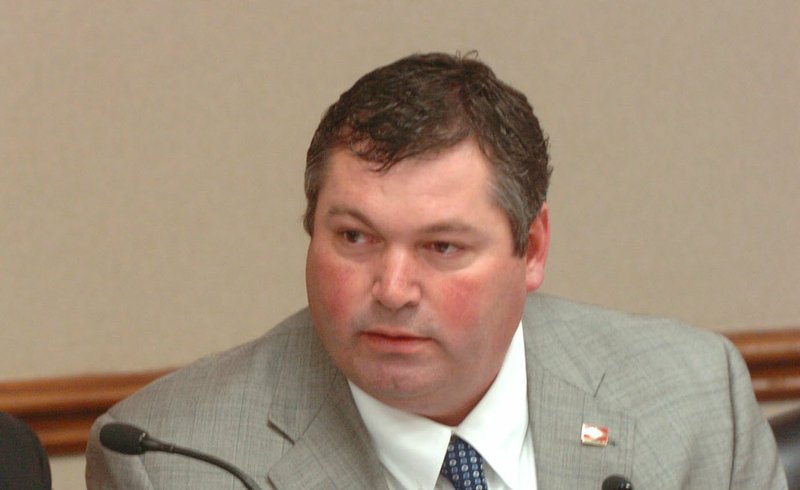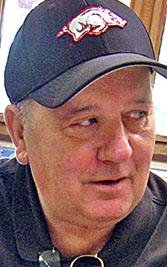The three guilty pleas marked significant moments in the long-running federal investigation into public corruption and bribery in Arkansas.
Former state Reps. Eddie Cooper and Henry "Hank" Wilkins IV and former nonprofit executive Jerry Walsh all admitted to political corruption crimes in separate cases in early to mid-2018.
Sentencing in federal criminal cases typically follows within six months, court observers say.
But it's been 22 months since Cooper, a Democrat from Melbourne, pleaded guilty in U.S. District Court in western Missouri.
Almost 20 months have passed since Wilkins, a Pine Bluff Democrat, pleaded guilty in federal court in Little Rock.
For Walsh, whose nonprofit once operated government-funded youth lockups, 17 months have passed since he admitted guilt in federal court in El Dorado.
Federal prosecutors in Arkansas and western Missouri have little to say about why the three remain unsentenced. They also wouldn't say when sentencing dates might be set.
Other lawyers who practice in federal court and aren't part of these three cases told the Arkansas Democrat-Gazette that court watchers look at these long timelines and usually figure the guilty parties are still sharing information with prosecutors in an effort to lighten their own sentences.
Another likely scenario is that defendants who have admitted guilt are waiting to testify in trials of others accused in the same criminal situation.
[RELATED » Other defendants in corruption inquiry]
John Wesley Hall, who has practiced in federal courts since 1980, said he expects the typical time period between guilty plea and sentencing to stretch at least four months, to give probation staffs time to prepare sentencing reports and to allow lawyers for both sides to argue sentence lengths.
But "sentencing normally occurs, at the worst, within six months" of pleading guilty, Hall said.
"The length of time" for Cooper, Wilkins and Walsh since admitting guilt "tells me they're still cooperating," Hall said, though he added that benefits for cooperation can be given before or after sentencing.
Mark Hampton, a defense lawyer in Little Rock who has practiced in federal court for 34 years, said that when he sees cases drag on for up to 18 months after sentencing, they almost always involve large, complex investigations and cooperation with prosecutors.
That describes the five-year federal investigation into Arkansas political corruption, which prosecutors say is still open.
The idea that governs plea agreements with federal prosecutors, Hampton said, is: "If you help the government, the government will help you" with shorter sentences. But it can take time to play out.
There are a couple of other possibilities for the lengthy delay in sentencing since the three guilty pleas, court experts say.
Federal prosecutors will delay sentencing if they have another suspect in the same crime who hasn't been indicted, Hampton said.
And the prosecutors will ask for delays if they expect a guilty defendant to testify at trial against others who are indicted and have pleaded innocent. Prosecutors want to actually hear that testimony before deciding whether to recommend a shorter sentence for the cooperating witness, Hampton said.
Hall named a few other issues that can delay sentencing, including a defendant's personal health or the health of a close family member.
Spokesmen for U.S. Attorneys Duane "Dak" Kees in western Arkansas and Timothy Garrison in western Missouri released statements that contained identical wording that suggested another possibility -- private legal matters.
"Non-public aspects" of a case such as "a defendant's private legal matters or decisions of the court" could play a role, both spokesmen wrote. They declined to elaborate.
The sprawling federal investigation in Arkansas and western Missouri, which came to light with a first guilty plea in January 2017, has revealed a cottage industry of bribes for favorable legislation, state grants and regulations at the Arkansas Capitol.
Charges have involved bribes paid by a small, private Arkansas college; Walsh's nonprofit, South Arkansas Youth Services; and a Missouri behavioral health treatment nonprofit, Preferred Family Healthcare Inc., which once was Arkansas' largest government-funded provider of mental health care.
Five former Arkansas lawmakers, including former state Sen. Jeremy Hutchinson, R-Little Rock, have been convicted in connection with public corruption schemes. The others are Cooper, Wilkins former Sen. Jon Woods and former Rep. Micah Neal.
Eleven other players -- including longtime Capitol lobbyist Milton "Rusty" Cranford, Ecclesia College's former president and former executives at Preferred Family -- have been charged.
Eight of the 11 have pleaded guilty or been found guilty at trial. The other three, former Preferred Family executives Tom and Bontiea Goss and former Arkansas orthodontist Benjamin Burris, have pleaded innocent and await trial.
MORE ON THE CASES
Cooper pleaded guilty Feb. 13, 2018, to one count of conspiracy to embezzle from Preferred Family Healthcare. He was accused of working with Cranford to use the nonprofit's money illegally for lobbying and political campaign contributions aimed at getting Arkansas grants and other funding for the nonprofit. They also received kickbacks.
Granted pretrial release in early 2018, Cooper was arrested on a charge of driving while intoxicated on July 16, 2018, in Mountain View and refused to submit to a chemical test, court records show. After inpatient substance-abuse treatment, Cooper was ordered to home detention with exceptions such as work, school and medical visits, and was banned from driving.
A Missouri federal magistrate approved removal of the location monitoring requirement May 14. Cooper was acquitted of the DWI charge on July 11, and his driving privileges were reinstated July 24.
The most recent court filing was a presentence investigation report July 31, which is routinely sealed from the public until sentencing.
Wilkins pleaded guilty April 30, 2018, to one count of conspiracy to commit offenses against the United States in connection with bribery concerning programs receiving federal funds.
He was accused of helping pass laws to benefit Preferred Family and Walsh's nonprofit, South Arkansas Youth Services, and receiving more than $80,000 in cash through Cranford and his lobbying firm.
His sentencing last was scheduled for Jan. 30, 2019, but it was canceled without explanation on Jan. 16 by U.S. District Judge Brian Miller. The sentencing hearing "will be reset at a later date," a court order says.
"Unfortunately, the reasoning behind why [sentencing] has not been scheduled is part of what we are not at liberty to discuss. I can assure you that it will make sense once Mr. Wilkins has been sentenced," Wilkins' defense attorney, Bill Stanley of Jonesboro, said in an email.
Walsh pleaded guilty July 19, 2018, to one count of conspiracy. He was accused of relaying more than $380,000 of South Arkansas Youth Services' money to Cranford and a still-unnamed state senator identified as "Arkansas Senator C" in court records.
Walsh's admitted goal was to preserve state contracts for his agency and influence state legislators to enact helpful legislation. Presentence reports have been filed but are sealed from the public.
In the most recent court filings, prosecutors and defense attorneys on May 13 made sentencing arguments about why Walsh should serve more or less time than guidelines recommend. No sentencing date has been set.
While court defendants have a right to speedy trials under the U.S. Constitution, they aren't entitled to speedy sentencing, according to a 2016 U.S. Supreme Court ruling.
In 2016's Betterman v. Montana, No. 14-1457, the court unanimously decided that speedy-trial rights exist to protect defendants who are considered innocent, which is the presumption before trial verdict or plea. After defendants plead guilty, that protection no longer applies.
Jerry Walsh, former executive director of now-closed South Arkansas Youth Services agency, Magnolia, is shown in this file photo.
A Section on 12/26/2019


